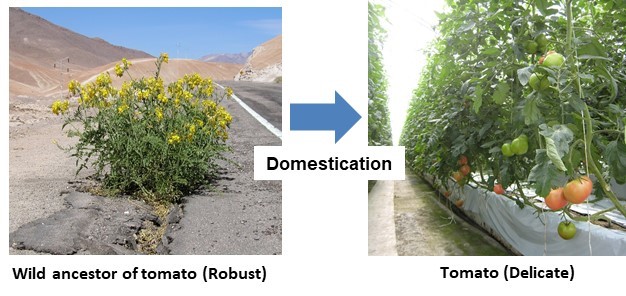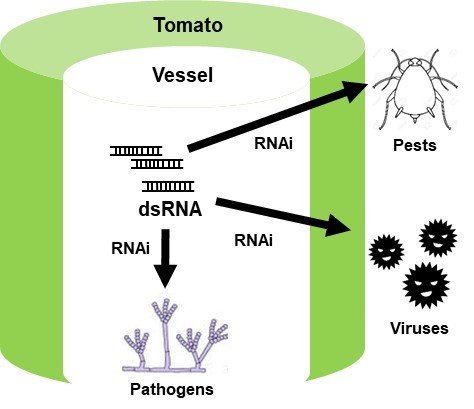Toshiyuki Fukuhara
| Position | Professor |
|---|---|
| Affiliation | Institute of Global Innovation Research |
| URL | https://kenkyu-web.tuat.ac.jp/Profiles/2/0000199/profile.html?lang=en |
【FOOD】 Fukuhara Team
Plants always grow and survive under biotic stresses, such as pathogens and pests, and abiotic (environmental) stresses, such as drought, salt, high temperature and low temperature. Many wild plants and wild ancestors of domesticated plants have mechanism(s) for resistance against these biotic and abiotic stresses. It is assumed that these stresses cause 70% to 50% reduction of crop production worldwide. Therefore, biotic stress and abiotic stress tolerance mechanisms inherent in plants should be elucidated for breeding of stress-tolerant crops (edible plants).
In recent years, comprehensive RNA-seq analysis of various species has revealed that various viruses have been latently infected (asymptomatic infection) in many wild plant species and ancestors of crops. Our research object is elucidating the relationship between activation of RNA interference (RNAi) mechanisms in host plants by latent virus infection and resistance to biotic and abiotic stresses. At the same time, to confer crops (edible plants) on resistance to biotic stresses (pathogens, viruses and pests) by inducing RNAi by directly applying or absorbing double-stranded RNA to plants is our object (goal).

The RNA interference (RNAi) mechanism is one of regulatory mechanisms for gene expression by small RNAs of 21 to 24 nucleotides in length produced from double-stranded RNAs (dsRNAs). This mechanism is considered to be a major defense mechanism against various external pathogens (biotic stress) including nucleic acid parasites such as viruses and transposons. At the same time, it has been reported that small RNAs play an important role in response to abiotic (environmental) stresses such as drought, low temperature and nutrient deficiency.
In this study, we have a hypothesis that wild plants, including ancestors of domesticated (crop) plants, are always exposed to abiotic (environmental) and biotic stresses, and whose RNAi mechanisms should be usually activated. In wild plants asymptomatically infected with latent viruses, RNAi mechanism(s) could be activated for resistance to various environmental and biotic stresses. In addition, we are planning to develop a method for induction of RNAi in edible (crop) plants to modulate their resistance to biotic stress (pests) and environmental stress by direct applying or absorbing dsRNAs to plants.
This research aim to activate RNAi mechanism to confer resistance to biotic and abiotic stresses on crops, leading to a safe and secure technology that does not depend on GMOs or chemical pesticides. Therefore our approach is likely to be accepted by society as a future practical technology that meets the Social Development Goals (SDGs).

Wild tomato plants (Solanum chilense) collected from Chile in South America are considered to be salt- and drought tolerant because they grow in dry areas containing high concentrations of sodium chloride and boron salts that other wild plants are unable to grow. They are thought to have their own mechanism of environmental stress tolerance. To elucidate this mechanism in wild tomato plants, we compare them with domesticated tomato plants. Wild tomato plants are also resistant to pathogens (biotic stresses) such as viruses and filamentous fungi. To elucidate the mechanism of biotic stress tolerance of wild tomato plants, we examine wild and domesticated tomato plants inoculated with Fusarium oxysporum f. sp. Lycopersici.
Arabidopsis halleri, a perennial plant belonging to the Brassicaceae family closely related to the model plant A. thaliana, is reported to be resistant to heavy metals such as zinc and cadmium, and to be infected with multiple viruses asymptomatically. In other words, A. halleri is resistant to both biotic stress (virus infection) and environmental stress (heavy metals). To elucidate the molecular basis of resistance mechanisms to both biotic stress (virus infection) and environmental stress (heavy metal), we are analyzing the activation of RNAi and endogenous plant hormones in virus-infected plants.
In parallel with research to elucidate the resistance mechanisms of these wild and edible plant species to both biotic and abiotic stresses, we aim to create stress-tolerant plants and RNAi pesticides by using the RNAi mechanism. Specifically, we aim to develop a technology for the control of pests and diseases by the foliar application or absorption of dsRNA onto edible plants (tomatoes) to induce RNAi against pest arthropods (spider mites), pathogens (tomato wilt fungus), and viruses (tomato yellow leaf curl virus).


| Position | Professor |
|---|---|
| Affiliation | Institute of Global Innovation Research |
| URL | https://kenkyu-web.tuat.ac.jp/Profiles/2/0000199/profile.html?lang=en |

| Affiliation | Texas A&M University (U.S.A.) |
|---|---|
| Division / Department | Department of Horticultural Sciences |
| Position | Professor |
| URL | https://hortsciences.tamu.edu/people/faculty-2/hisashi-koiwa/ |

| Affiliation | University of Cordoba (Spain) |
|---|---|
| Division / Department | Department of Genetics |
| Position | Full Professor |
| URL |

| Affiliation | Oregon State University (U.S.A.) |
|---|---|
| Division / Department | Department of Botany and Plant Pathology |
| Position | Associate Professor |
| URL |

| Affiliation | University of Tartu (Estonia) |
|---|---|
| Division / Department | Plant signal research group |
| Position | Professor |
| URL |

| Affiliation | University of Western Ontario (Canada) |
|---|---|
| Division / Department | Department of Biology |
| Position | Associate Professor |
| URL |
Tsutomu Arie (Institute of Agriculture / Professor)
Taishi Umezawa (Institute of Agriculture / Professor)
Takeshi Suzuki (Institute of Agriculture / Associate Professor)
Midori Tabara (Institute of Global Innovation Research / Assistant Professor) (2020.04.01 – 2021.03.31)
このページの上部へ